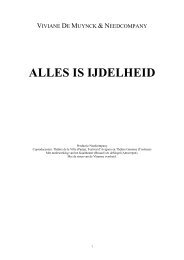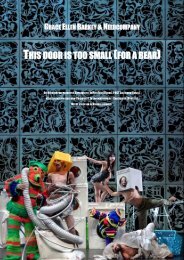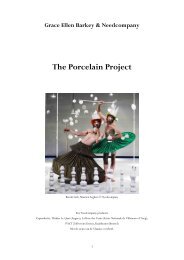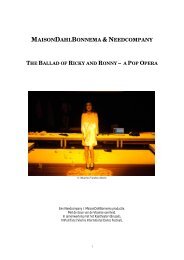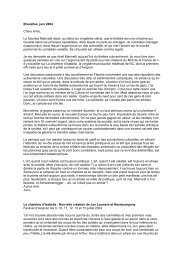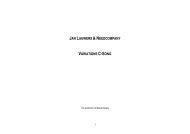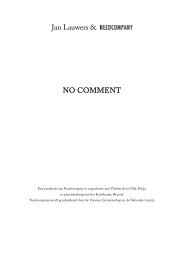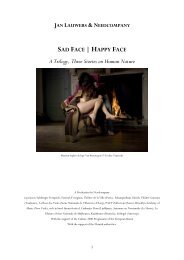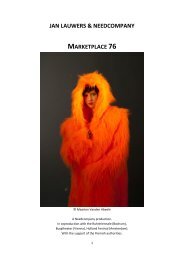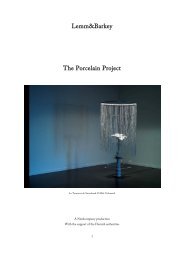THE ART OF ENTERTAINMENT - Needcompany
THE ART OF ENTERTAINMENT - Needcompany
THE ART OF ENTERTAINMENT - Needcompany
You also want an ePaper? Increase the reach of your titles
YUMPU automatically turns print PDFs into web optimized ePapers that Google loves.
Beauty, that Marcel Duchamp submitted a urinal for an exhibition in New York. The organisers thought that<br />
it was sent as an insult so the object was refused. But Duchamp’s intention was a much greater and more<br />
fundamental insult, the aftershocks of which can still be felt today. In 2004 the work was selected by a<br />
panel of 500 art aficionados as the most influential work of art of the 20th century. Once the fountain had<br />
been turned on its head and become a urinal, there was no going back. From that moment on, art exists<br />
thanks to the autonomous gesture of artists who are able to declare that all objects are art by putting them<br />
in the right environment. Any reference to a history or tradition, to the craftsmanship and technical skills,<br />
to a recognisable and representable reality, loses its necessity for art. It is essential to be absolutely<br />
modern: being absolutely modern is about constant fracturing, a new beginning, the tabula rasa,<br />
destruction. Destroying and creating, insulting and affirming in one and the same gesture. “Delete the old<br />
days”, wrote Kasimir Malevitsj in a short poem before he painted White square on a white background<br />
(1918): “Try to never repeat, in icons, or in paintings, or in words/ If the fact of doing something reminds<br />
you of something done in the past, the voice of the new birth tells me:/ delete, shut up, put the fire out if it<br />
is fire,/If you want the drift of your thoughts to be lighter and to not go rusty,/ in order to waft the breeze<br />
of a new day into the desert.”<br />
6. The matrix of amusement<br />
In 1984 (1948) Georges Orwell wrote how modern society was falling prey to an excess of totalitarian<br />
control and authoritarian violence. In A Brave New World (1932) Aldous Huxley revealed a completely<br />
different vision of decline. In his world, there is no need for a Big Brother who deprives people of their<br />
autonomy, their insights and their history. According to Huxley the people started to love those who<br />
oppress them and admire the technologies that keep them under control. In his book Amusing Ourselves to<br />
Death (1985) the American sociologist Neil Postman analyses the difference between two futuristic visions,<br />
he adopts that of Huxley in which people allow themselves to plunge into a sort of blessed state of<br />
drowsiness and voluntarily relinquish their rights. For Postman television was the medium par excellence to<br />
put people into this type of comatose state: the audiences give up their individual rights in exchange for<br />
entertainment. Media are no longer technological tools or instruments that are at our service. They have<br />
become the stage on which we can appear. We are seduced by them. We live ‘in’ the media. We are<br />
surrounded by them. We are submerged in them. Is there a real world behind the media world, in the same<br />
way that there is a real world behind the wings where illusions are lost? A world in which the way illusion is<br />
created is revealed? ‘Welcome to the real world’. This famous line, comes from the film The Matrix and is<br />
uttered by Morpheus the head of the resistance when Neo, the hero of the film, gains an insight into the<br />
virtual construction of our reality, generated and controlled by a gigantic computer that everyone is hooked<br />
up to. Human beings are kept in an artificial dream-like state and only thinks that they exist. The ‘real’<br />
reality that the hero gains access to is the desolate desert landscape of Chicago that lies in ruins following a<br />
global catastrophe. Which is the catastrophe that is concealed behind our media society? If the world is<br />
presented to us like a play in which we are allowed to play a role, what lies behind the curtains? What<br />
happens when the show is over? According to the philosopher Henk Oosterling we are characterised by<br />
what he calls ‘radical mediocrity’: we are radically immersed in the media. The media (from cars to mobile<br />
phones, from microwave ovens to CNN, from microchips to cyberspace, from biotechnology to intelligent<br />
weapons) have become the ‘environment’ in which we exist. “If media have become the environment, the<br />
question of whether a medium is good or bad can no longer be answered,” added the philosopher. Any<br />
pure criticism of our media-driven condition is no longer feasible because in order to present their critique,<br />
they are forced to use the media that are being criticised. “Any medium starts as a liberation and ends up<br />
as a problem. A medium becomes mature as soon as it overtakes and turns its creator into a slave. In the<br />
9



